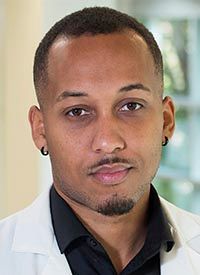Press Release
Article
Fox Chase Researcher Henkel Valentine Recognized as an IMPACT Fellow by the National Postdoctoral Association
Author(s):
Henkel Valentine, PhD, a postdoctoral fellow in the lab of Philip Abbosh, MD, PhD, in the Nuclear Dynamics and Cancer Research Program at Fox Chase Cancer Center, was one of six postdoctoral researchers nationwide recently recognized as an IMPACT Fellow by the National Postdoctoral Association.
Henkel Valentine, PhD

Henkel Valentine, PhD, a postdoctoral fellow in the lab of Philip Abbosh, MD, PhD, in the Nuclear Dynamics and Cancer Research Program at Fox Chase Cancer Center, was one of six postdoctoral researchers nationwide recently recognized as an IMPACT Fellow by the National Postdoctoral Association.
The association is a charitable and educational nonprofit organization that works to improve the postdoctoral experience by supporting a culture of inclusive connection. The organization was formed in 2003 with the goal of effecting positive change for postdoctoral scholars.
“Being selected as a 2023-2024 IMPACT fellow is an honor, and I am proud to be a part of this year’s cohort,” said Valentine. “I intend to utilize the extensive resources and network allotted to IMPACT fellows to further my development as a cancer researcher and refine my scientific method.”
Valentine’s work involves using the gene editing tool CRISPR to develop mouse models of bladder cancer to replicate mutations commonly seen in bladder cancer patients. The model will be used to nominate new therapy options on which to base clinical trials for bladder cancer patients.
The IMPACT Fellowship Program was launched in 2021. It provides exceptional early-career researchers from under-represented communities with opportunities for professional and personal achievement.
During the 16-month program, fellows work with experts in their field, network with peers, and make mentoring connections that will help build their professional relationships. Fellows additionally use the knowledge, tools, and resources that they gain from the program to create and implement projects that benefit their home communities. These projects are discussed with peers during the program’s annual summit, where researchers receive valuable feedback from experts in the field.
“In STEM, particularly in fields like cancer research, there’s a significant lack of representation from the Black community,” Valentine said. “My IMPACT project aims to inspire and educate high school students of Black ancestry about the possibilities within STEM. We’ll achieve this by connecting them with professionals who share their background through career talks and interactions, demystifying scientific research, and sparking their passion for STEM.”
“We are thrilled to welcome this cohort of remarkable individuals who are not only striving to reach their full potential but committed to lift up one another along the way,” said Thomas P. Kimbis, JD, Executive Director and Chief Executive Officer of the National Postdoctoral Association. “By strengthening themselves through the IMPACT program, they position themselves as leaders within their fields, their communities, and our society.”








